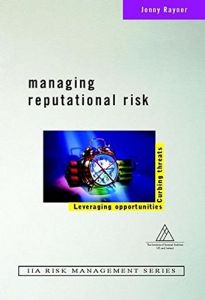Join getAbstract to access the summary!

Join getAbstract to access the summary!
Jenny Rayner
Managing Reputational Risk
Curbing Threats, Leveraging Opportunities
Wiley, 2003
What's inside?
Whose reputation is more important than a pretty young girl’s and just as easy to lose? Your company’s. Avoid the risk.
Recommendation
The reputations of several major corporations (Enron, WorldCom, Parmalat and Tyco, to name a few) recently suffered from allegations of fraud, self-dealing, insider trading, accounting shenanigans and various other misdeeds. The sense of scandal became so pervasive that some businesspeople felt ashamed of their profession. Now, the mere rumor of misconduct is sufficient to send a company’s stock price down. Ironically, in an era when the transnational corporations seem omnipotent in their globe-girdling might, many of them greatly resemble nubile maidens in an eighteenth century romance, their whole fate dependent on spotless and easily marred reputations. That being the case, every business and every business manager should prioritize the careful husbanding of reputation. getAbstract.com finds that this book, which has been highly praised by some of the most estimable authorities on business ethics and management, offers a comprehensive, if sometimes pedantic, guide to every step of building, measuring, preserving and growing reputation capital.
Summary
About the Author
Jenny Rayner is an independent U.K.-based consultant, founder of Abbey Consulting and executive editor of the Business Risk Management Handbook.


















Comment on this summary